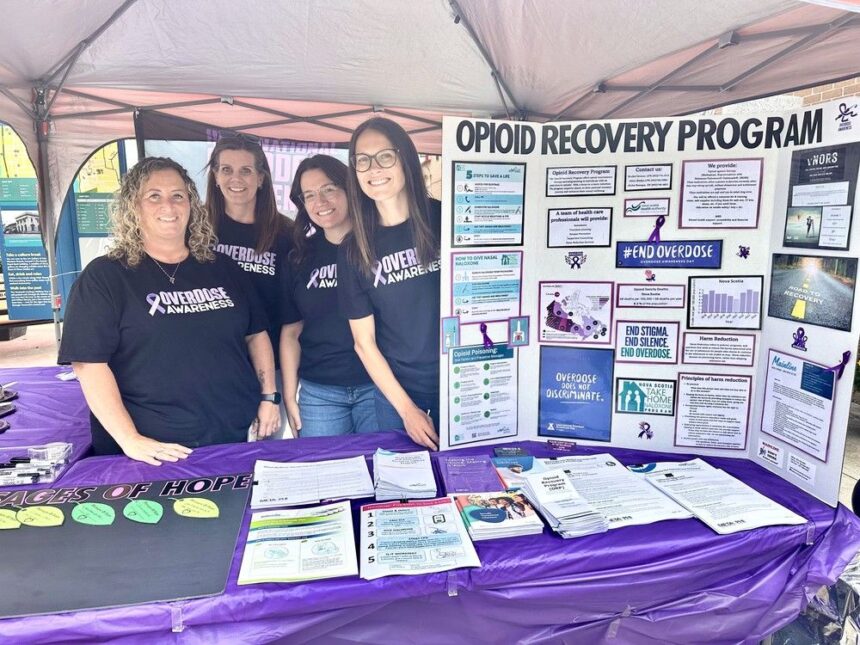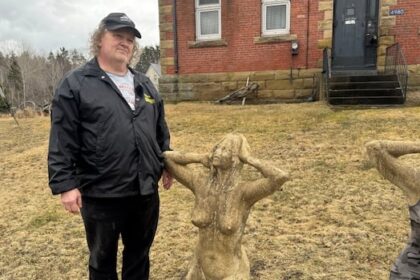Event was held in conjunction with International Overdose Awareness DayPublished Aug 31, 20256 minute readMembers of Nova Scotia Health’s Western Zone’s Opioid Recovery Centre held an event in downtown Yarmouth on Aug. 29, in advance of International Overdose Awareness Day on Aug. 31, to spread awareness about overdose prevention, and supports and resources that that exist in the community and region. Pictured are Chrissy Chandler, Rachel Deveau, Alisha Bourque and Victoria Dixon. TINA COMEAUArticle contentThe display set up on the table contained a lot of useful and important information. But scattered amongst the brochures, the purple ribbons, the free Narcan kits, and the well intentions was a one message that truly summed up why this all was needed.THIS CONTENT IS RESERVED FOR SUBSCRIBERS ONLY.Subscribe now to access this story and more:Unlimited access to the website and appExclusive access to premium content, newsletters and podcastsFull access to the e-Edition app, an electronic replica of the print edition that you can share, download and comment onEnjoy insights and behind-the-scenes analysis from our award-winning journalistsSupport local journalists and the next generation of journalistsSUBSCRIBE TO UNLOCK MORE ARTICLES.Subscribe or sign in to your account to continue your reading experience.Unlimited access to the website and appExclusive access to premium content, newsletters and podcastsFull access to the e-Edition app, an electronic replica of the print edition that you can share, download and comment onEnjoy insights and behind-the-scenes analysis from our award-winning journalistsSupport local journalists and the next generation of journalistsRegister to unlock more articles.Create an account or sign in to continue your reading experience.Access additional stories every monthShare your thoughts and join the conversation in our commenting communityGet email updates from your favourite authorsSign In or Create an AccountorArticle contentSaid the message: Overdose does not discriminate.Article contentArticle contentA couple of days ahead of Aug. 31, which is International Overdose Awareness Day, Nova Scotia Health’s local Mental Health and Addiction’s Opioid Recovery Program team held an event in Yarmouth in Jim MacLeod Square (formerly Alma Square) on Aug. 29 to raise awareness about overdose and substance abuse.Article contentArticle contentWhile passersby were interested in the cake the team was handing out, the team truly hoped that people would take the time to ask questions, to learn about the Naloxone program, and to gather information pertaining to overdose prevention and the resources and supports that exist in the region to help those in the community who are struggling with addiction and substance abuse.Article content“Our goal being out here is to connect with the community and to raise awareness around overdose, provide some education, information about resources that are available, and do some Naloxone teaching if individuals are interested,” said Victoria Dixon, manager of the western region’s Nova Scotia Health Opioid Recovery Program.Article content“This is really for us to connect with individuals who live in the community. For us to generate conversation and build relationships to raise awareness, so that we can collectively support individuals in recovery,” Dixon said, adding while many of their supports and programs are housed at the Yarmouth Regional Hospital, they do outreach into Digby and Shelburne counties to provide these services as well. As well, there are satellite sites in Clark’s Harbour and Clare.Article contentArticle content Aug. 31 is International Overdose Awareness Day. But it’s messages are important any day of the year. TINA COMEAUArticle contentDixon said part of the good news is that there are many more supports, programs and clinics that exist now regionally compared to a few years ago. A visit to the Nova Scotia Health website sees people scrolling through a list of supports, whereas years ago the options were fewer.Article contentArticle contentExamples of substance abuse resources and supports in the area that are listed on Nova Scotia Health’s Mental Health and Addictions website for the Yarmouth Regional Hospital and western region (including hours of operation and availability, and what the clinics and programs) offer, include:Article content• A Recovery Support Centre at the Yarmouth Regional Hospital.Article content• Community Support Service (Child and Adolescent).Article content• Community Support Service (Adults).Article content• Outpatient Withdrawal Management.Article content• Opioid Recovery Program.Article content• Stop Smoking Program.Article content• Inpatient Mental Health Services.Article content• Adult Community Mental and Addictions Services.Article content• Child and Adolescent Services.Article content• Adolescent Outreach Services.Article content Overdose awareness, prevention and health-care resources was front and centre at a display held in downtown Yarmouth on Aug. 29 by Nova Scotia Health’s Opioid Recovery Program. TINA COMEAUArticle contentRECOVERY CENTRESArticle contentThe provincial government has been announcing newly-opened locations of walk-in recovery centres for substance use that are available across the province. The latest announcement referenced a new one in Truro. The province says there are 12 recovery support centres in the province, including ones also in Yarmouth, Amherst, Springhill, Dartmouth, Evanston (Richmond County), Halifax, Lunenburg, Middleton, New Glasgow, North Sydney and Sydney.Article contentThe one in Yarmouth is located at the hospital is in a space formerly known as the Wellness Centre. One shortcoming is that the recovery centre is available to adults, 19 and over.Article content“The Recovery Support Centre and the Opioid Recovery Program, they are 19-plus, but in saying that, we’ve done work with the Opioid Recovery Program, partnering with the IWK, so that if somebody under 19 reaches out for support, we will be able to support and navigate that pathway with them,” Dixon said, noting there are also other programs and services for adolescents and youth offered locally and through partnerships.Article contentArticle contentAbout the recovery centres, she said they are intended to be “low-barrier, access-to-care points” for people struggling with a substance abuse disorder.Article content“They can walk in and receive support in the moment,” Dixon said, saying supports include outpatient withdrawal management or a referral pathway to inpatient withdrawal management. There is also one-on-one support and group programming, as well as harm reduction supports. There can be individualized care plans structured for those in need.Article contentENDING STIGMASArticle contentAnother important thing that is key to overdose and substance abuse awareness is breaking down stigmas. Because while it is important that resources exist, it is vitally important for people to feel comfortable and supported in accessing them.Article contentArticle contentSupport versus judgment goes a long way.Article content Breaking down stigmas surrounding substance abuse are important so that people seeking and needing help will feel supported and not judged. Judgment can be a barrier to seeking help. TINA COMEAUArticle content“Stigma is at the forefront of why we’re here today. We need individuals to feel safe in reaching out for support. To feel safe in talking to their family and they’re friends,” Dixon said.Article content“In order for that to happen, for them to walk into the hospital and say, ‘I need help,’ we need to remove the judgment that exists and the stigma around substance abuse in our communities,” she said. “So that people know that others are ready and willing to support them and that it’s not something they need to isolate or hide.”Article contentNALOXONE KITSArticle contentAnother service during the Aug. 29 event was that training was being offered for Naloxone (Narcan) kits, which are widely available for free through community pharmacies, the recovery centres, and hospitals. Some community organizations also make them available. Nova Scotia Health’s ‘Take Home Naloxone Program’ website also includes a list, by county, of available locations where people can access the kits across the province. The training for the take-home kits is simple, with Nova Scotia Health saying it can be covered in 10 minutes.Article contentAdministering Naloxone can potentially reverse and stop an opioid poisoning/overdose.Article contentAccording to Nova Scotia Health’s Mental Health and Addictions Program, an opioid poisoning can occur for various reasons, such as changes in tolerance, mixing substances, or using alone.Article contentSigns of opioid poisoning include slow, shallow breathing or no breathing, discoloration of the lips or fingertips, deep snoring or gurgling sounds, cold/clammy skin, and unresponsiveness. An opioid poisoning can happen immediately or several hours after substance use.Article contentThe Naloxone, however, only works on opioids and not on the benzodiazepine family of drugs and pills.Article content“But if somebody has overdosed and you’re unsure about what substance they have overdosed on, it is not harmful to the individual to administer Naloxone, even if it’s not the right substance,” Dixon said.Article contentArticle content Nova Scotia Health’s Opioid Recovery Program offers opioid maintenance therapy and programming to individuals who have an addition to opioids. It also has a focus on harm reduction. TINA COMEAUArticle contentMORE RESOURCESArticle contentOverall, when it comes to local and regional Nova Scotia Health resources, Dixon said it is correct to say that in 2025, there are more resources available compared to a few years ago.Article content“I think that’s really important. So much progress has been made,” she said.Article content“I think we often focus on how much more progress we need to make, which is important because that’s what keeps us moving forward,” she said. “But at the same time, when we stop and reflect on that progress that’s been made, it’s phenomenal.”Article contentShe points to how in 2012, the Opioid Recovery Program was started in the Annapolis Valley only. At that time, when it began, there weren’t any health-based services outside of the province’s central zone.Article contentShe said in the Western Zone, the clinics that began in the Annapolis Valley expanded to the South Shore around 2018.Article content“In 2022, we expanded to Southwest. To think about going from our initial small clinic in the Valley, to having 12 clinics across the Western Zone, is really highlighting our focus on rural accessibility to a needed health-care service,” Dixon said.Article contentShe added that Mental Health and Addictions also does strategic planning as it continues to look at community needs.Article content“We know where we are right now,” Dixon said, saying as they look forward there are many considerations. “Where do we envision us being? What services do we want to see? How do we want to evolve and provide care to the communities that we serve? … We’ve already seen huge progress, but I think there’s a lot more to come.”Article contentArticle content
Overdose awareness, ending stigmas, supports and resources, were all part of Yarmouth event











